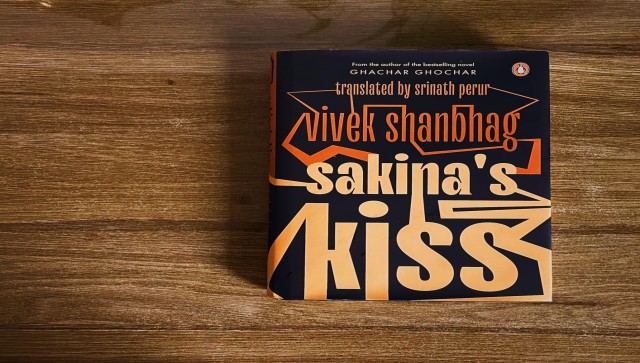Vivek Shanbhag, a prominent Kannada writer, once again engages readers with his latest novel, “Sakina’s Kiss,” translated into English by Srinath Perur. Following the success of “Ghachar Ghochar,” Shanbhag’s narrative mastery and Perur’s excellent translation have brought forth a literary gem again for us. “Sakina’s Kiss” revolves around Venkataramana, a mid-level executive living a seemingly ordinary life until a group of menacing men arrives, claiming to have business with his daughter, Rekha. As events unfold, Venkat finds himself entangled in a web of street gangs, murky journalism, and a haunting betrayal from the past. The novel ‘Sakina’s Kiss’ unfolds an engrossing tale of love, betrayal, and society’s underlying hypocrisy. One of the central themes is the examination of power dynamics within a family, described through subtle incidents and gestures. This theme echoes Shanbhag’s signature style, where the smallest details convey profound messages about relationships. While reading we find this isn’t just Venkat’s story; it’s about how he and his wife, Viji, find themselves in a sudden panic when their daughter Rekha goes missing from their village house. At the core of this novel are the unsettling events, primarily centred around Rekha, a free-thinking and somewhat rebellious young woman. Yet, it’s Venkat who takes centre stage in the story, forcing us to recognise the many others like him – flawed individuals who spend most of their lives attempting to mask their intense emotions with a veneer of calmness. A significant aspect of ‘Sakina’s Kiss’ revolves around the exploration of patriarchy and evolving masculinity. Venkataramana, the protagonist, grapples with changing familial dynamics, especially after the birth of his daughter, Rekha. The novel sensitively portrays the challenges of reconciling traditional expectations with modern ideals, reflecting the broader social changes in India. The novel also delves into the impact of cultural consumption on personal identity. Shanbhag suggests that the characters’ selves are shaped by the culture they consume, using Indian films and self-help books as significant influences on the protagonist, Venkat. This unique perspective adds layers to the narrative, highlighting the intricate relationship between individual identity and cultural context. Venkat’s journey from a romantic young man to a middle-aged individual trapped in mediocrity mirrors the complexities of social expectations and personal aspirations. We can also find that the novel subtly challenges traditional notions of masculinity, portraying Venkat as a product of his upbringing and cultural influences, ultimately leading to his isolation within his own family. The other characters in “Sakina’s Kiss” are also intricately woven into the fabric of the narrative, each contributing to the overall areas of the story. Venkat’s transformation from a hopeful romantic to a disillusioned individual is mirrored in his relationships with his wife, Viji, and daughter, Rekha. The discontent that arises from social expectations and personal desires adds depth to the character dynamics. Vivek Shanbhag writes in the book: That evening we aimlessly roamed the streets of Kodai. Viji was wearing a bright red cotton sari with a green border. As we went up and down the inclines, I told her how, the year I joined work, I went to Mumbai for a week-long management course. A man named Tiwari was one of the speakers, and some of us had gathered around him in the tea-break after his lecture. When I learnt his talk had been based on a book called ‘Another World’, I asked him, stupidly, where the book was available. I don’t know what he thought, but he drew a copy of the book from his bag, placed it in my hands, said ‘good luck’ and left. I started reading it that very evening. The other world of the book was the office, and it felt like every workplace problem described in it was taken from my own office. For someone like me, who came from a village, the office had become a place of silent dread. There were foreign clients to deal with, MBAs who held everything from the west as sacred. I felt suffocated without being able to say why. This book, and then others like it, helped me. With their pages as my wings, it felt like I could fly over everything that troubled me at work. As I immersed myself in book after book, I found that the things I read in them came back to me when I found myself in those situations. Not just that, I actually heard these parts in Tiwari’s voice. ‘You know,’ I said to Viji. ‘His voice is deep and serious, perfect for a guru.’ I explained to Viji that Tiwari had entered my life at a time when I was struggling even to talk to my colleagues. On the few occasions I worked up the courage to tell them I was feeling out of place, they looked at me kindly and brushed it off saying, ‘Don’t take these things so seriously.’ There was nothing in common between me and those who had grown up in the city. If they brought up the music of their youth and mentioned Metallica or Judas Priest, I would simply go quiet. ‘Oh! You poor thing!’ Viji said. ‘You didn’t know those bands. They’re not bad. But then, why should you have heard of them…’ I felt a little uneasy that she knew about that kind of music. But I also noticed that Viji paid attention to the smallest details when I told her about my life and ended up taking my side. I was overcome with affection. I yearned to unburden all my secrets to her. When I sensed Viji was willing to let me into her world, I asked, ‘Which was your first book?’ ‘It was called Talk to Me. It’s about having conversations with oneself. But it will take me a long time to tell my story. begins in childhood.’ What’s the rush? You can go on all day and all night if you want. I am here to listen. When Viji started, we were standing below a tree at a roadside teashop, her face dappled by the evening sun. Her hair was in a loose bun, held in place by a large clip. Her brown lips and the marks left by long-ago acne stood out in this light. Her nose was enticingly rounded at its tip. And how sexy a slight overbite is! She only had to part her lips a fraction to look desirable. I watched mesmerised every time she took a sip of tea and her lips moved to meet the rim of the cup. The ardour of a new marriage magnifies everything. I saw her upper lip rest on the cup’s rim, test the tea’s temperature, and then advance with a gentle quiver to take a sip. Unable to help myself, I said, ‘Hand me your cup for a second.’ [caption id=“attachment_13584862” align=“alignnone” width=“614”] Book: Sakina’s Kiss by Vivek Shanbhag, translated by Srinath Perur. Published by: Penguin Random House. Price: Rs.499[/caption] While reading we feel that Shanbhag’s peculiar style of storytelling, which is characterized by its simplicity and depth, shines throughout in the novel “Sakina’s Kiss.” The author’s ability to convey powerful messages through seemingly mundane incidents is evident, creating a novel that resonates with readers on multiple levels. The portrayal of Venkat’s family history, especially his uncle Ramanna, adds a layer of mystery and complexity to the tale. Author Vivek Shanbhag connects the dots to reveal the consequences of long-buried family secrets. The disappearances and unanswered questions create an atmosphere of suspense and contemplation, keeping the readers engaged throughout the novel. Srinath Perur’s translation preserves the essence of Shanbhag’s writing, maintaining a delicate balance between clarity and the unspoken nuances that make the storyline rich and thought-provoking. The translator deserves accolades for ensuring that the beauty and depth of Shanbhag’s narrative are not lost in translation, making it accessible to a wider audience. This book mirrors real life. And the story exposes this harsh reality. The title’s meaning becomes clear in a moment when we realise our hypocrisy. The endings of his tales leave you pondering, craving more, and wondering about potential sequels. The novel boldly underscores the constraints of our understanding, particularly the rigidity of the social system. The author is a Bengaluru-based management professional, literary critic, and curator. He can be reached at ashutoshbthakur@gmail.com. Views expressed in the above piece are personal and solely that of the author. They do not necessarily reflect Firstpost_’s views._ Read all the
Latest News
,
Trending News
,
Cricket News
,
Bollywood News
, India News
and
Entertainment News
here. Follow us on
Facebook
,
Twitter
and
Instagram
.
Book: Sakina’s Kiss by Vivek Shanbhag, translated by Srinath Perur. Published by: Penguin Random House. Price: Rs.499[/caption] While reading we feel that Shanbhag’s peculiar style of storytelling, which is characterized by its simplicity and depth, shines throughout in the novel “Sakina’s Kiss.” The author’s ability to convey powerful messages through seemingly mundane incidents is evident, creating a novel that resonates with readers on multiple levels. The portrayal of Venkat’s family history, especially his uncle Ramanna, adds a layer of mystery and complexity to the tale. Author Vivek Shanbhag connects the dots to reveal the consequences of long-buried family secrets. The disappearances and unanswered questions create an atmosphere of suspense and contemplation, keeping the readers engaged throughout the novel. Srinath Perur’s translation preserves the essence of Shanbhag’s writing, maintaining a delicate balance between clarity and the unspoken nuances that make the storyline rich and thought-provoking. The translator deserves accolades for ensuring that the beauty and depth of Shanbhag’s narrative are not lost in translation, making it accessible to a wider audience. This book mirrors real life. And the story exposes this harsh reality. The title’s meaning becomes clear in a moment when we realise our hypocrisy. The endings of his tales leave you pondering, craving more, and wondering about potential sequels. The novel boldly underscores the constraints of our understanding, particularly the rigidity of the social system. The author is a Bengaluru-based management professional, literary critic, and curator. He can be reached at ashutoshbthakur@gmail.com. Views expressed in the above piece are personal and solely that of the author. They do not necessarily reflect Firstpost_’s views._ Read all the
Latest News
,
Trending News
,
Cricket News
,
Bollywood News
, India News
and
Entertainment News
here. Follow us on
Facebook
,
Twitter
and
Instagram
.
Book review | Sakina's Kiss: An engrossing tale of love and betrayal
Ashutosh Kumar Thakur
• January 7, 2024, 09:54:48 IST
The novel boldly underscores the constraints of our understanding, particularly the rigidity of the social system
Advertisement
)
End of Article